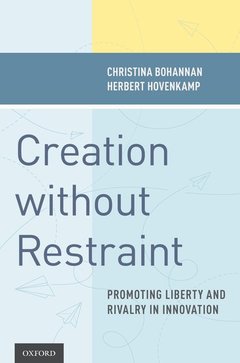Description
Creation without Restraint
Promoting Liberty and Rivalry in Innovation
Authors: Bohannan Christina, Hovenkamp Herbert
Language: English
Subject for Creation without Restraint:
Approximative price 82.73 €
In Print (Delivery period: 21 days).
Add to cart
Publication date: 07-2012
440 p. · 16.2x24.3 cm · Hardback
440 p. · 16.2x24.3 cm · Hardback
Description
/li>Contents
/li>Biography
/li>
Both antitrust and intellectual property laws are intended to facilitate economic growth. Antitrust is meant to encourages competition of all kinds and intellectual property law should offer inventors and artists the correct incentives to develop new ideas and technologies, but the harsh reality is that antitrust and IP laws have wandered off this course. In Creation without Restraint: Promoting Liberty and Rivalry in Innovation, Christina Bohannan and Herbert Hovenkamp analyze the current state of competition (antitrust) and intellectual property laws, and propose realistic reforms that will encourage innovation. As with antitrust and a reform process that aligned injury requirements in lawsuits with the incentive to compete, this book proposes similar reforms for patent and copyright law, and considers both the uses and limitations of antitrust as a vehicle for intellectual property law reform. This book considers how antitrust and IP law should engage practices that restrain rather than promote innovation, and covers the troubled topic of IP "misuse," which the authors suggest needs a broader reach but narrower remedies. Bohannan and Hovenkamp also evaluate the uses and limits of antitrust to address a variety of practices in innovation intensive markets, including interconnection in networks, duties to deal, and internet neutrality. The book constructs a framework and rules for governing the "innovation commons," or the vast area that involves collaborative innovation. Finally, it considers ways to further competition in the licensing and distribution of IP rights, and offers several proposals for specific reforms, most of which can be instituted by the courts without the need for new legislation.
Acknowledgments. Introduction. Ch. 1 Competition Policy in IP Intensive Markets. Ch. 2 Complementary and Network Relationships. Ch. 3 The Importance of Harm. Ch. 4 Innovation, Competition and the Patent System. Ch. 5 Increasing the Social Value of Patents. Ch. 6 How Copyright Has Been Captured and Why it Matters. Ch. 7 A Theory of Copyright Harm. Ch. 8 Reclaiming Copyright: Constitutional Review and Statutory Interpretation. Ch. 9 Restraints on Innovation. Ch. 10 Misuse. Ch. 11 Innovation and Exclusion. Ch. 12 The Innovation Commons. Ch. 13 Post-Sale Restraints. Epilogue. Index.
Christina Bohannan is Professor of Law at the University of Iowa College of law, where she teaches copyright law, intellectual property advocacy, torts, constitutional law, and conflict of laws. She worked as an engineer before attending law school at the University of Florida, where she ranked first in her class and served as editor-in-chief of the Florida Law Review. She was a law clerk to Judge Edward E. Carnes, U.S. Court of Appeals for the 11th Circuit. Professor Bohannan has published major articles in the Fordham, NYU, Hastings, Boston College, Washington University, Cardozo Arts & Entertainment, and Maryland Law Reviews. Her work was selected for the 2005 Stanford/Yale Junior Faculty Forum. Herbert Hovenkamp is the Ben V. & Dorothy Willie Professor of Law at the University of Iowa. He is a fellow of the American Academy of Arts and Sciences, and in 2008 won the Justice Department's John Sherman Award for his lifetime contributions to antitrust law. He has written over 100 law review articles and several books including Antitrust Law (with the late Phillip E. Areeda and Donald F. Turner); The Antitrust Enterprise: Principle and Execution (2006); Federal Antitrust Policy: The Law of Competition and Its Practice (4th ed. 2011); IP and Antitrust: An Analysis of Antitrust Principles Applied to Intellectual Property Law (2010); and Enterprise and American Law, 1836-1937 (1991).
© 2024 LAVOISIER S.A.S.




